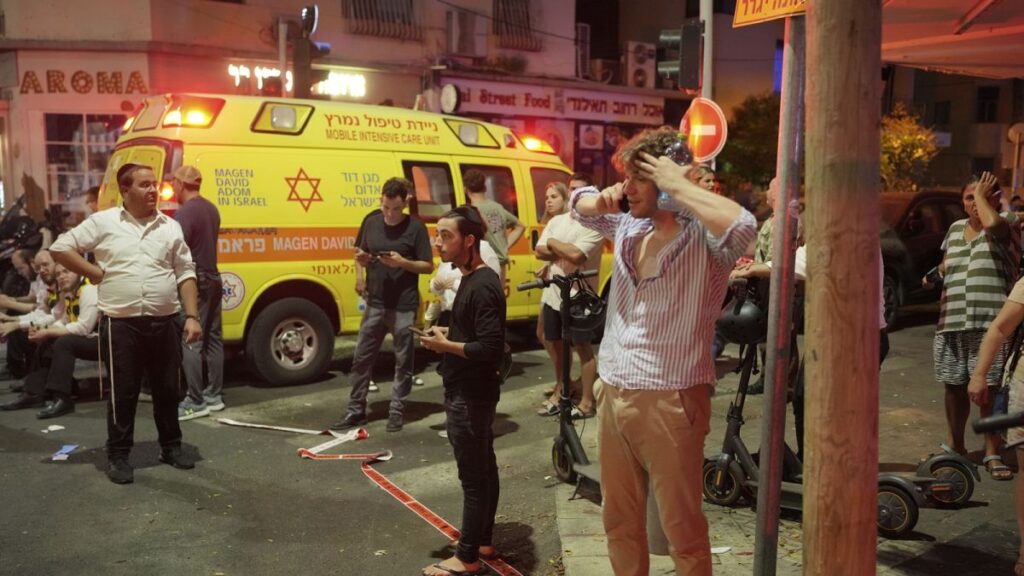The Houthis have claimed that their new drones can bypass Israel’s air defense systems. However, the Israeli military says the drone was identified on Thursday but not intercepted due to “human error.”
Yemen’s Houthi rebels claimed responsibility for a drone attack early this morning that hit part of central Tel Aviv near the US embassy, causing at least ten injuries and one death.
The airstrike scattered glass debris over a wide area.
The Houthis have repeatedly launched drones and missiles toward Israel throughout the past nine months of war, in solidarity with the Palestinians. But until Friday, all of these devices had been intercepted by Israel or Western allies, whose forces are present in the region.
Houthi spokesman Yahya Sare’e said in a statement posted on the social media site X that the strike was carried out in retaliation for the ongoing war in Gaza between Israel and Hamas and hit one of the group’s many targets.
The Houthis have claimed that their new drones can bypass Israel’s air defense systems. However, an Israeli military spokesman said Friday that the explosive-laden drone had been identified as early as Thursday. He instead attributed the strike to “human error”The military’s assessment of the air threats has not changed, as, according to the military, Israel’s adversaries have been attempting such strikes for months.
“This was a terrorist attack aimed at killing civilians in Israel,” the Israeli spokesman said.
Tel Aviv police said Friday’s explosion sounded around 3:10 a.m., reverberating through nearby towns and physically injuring at least 10 people. Tel Aviv district commander Peretz Amar said officers were unable to locate the point of contact, suggesting the blast occurred in the air.
“The force of the explosion caused damage that is not very significant, but it extends over a wide area. At the moment, we do not know what the object was,” he said.
Israel has a multi-layered air defense system, capable of intercepting threats ranging from long-range ballistic missiles to drones and short-range missiles. These systems have intercepted thousands of projectiles throughout the war. However, officials of the system acknowledge that they are not 100% effective and that the systems appear to have struggled to counter small, hard-to-detect attack drones. It is unclear which system was deployed in these specific cases.
Hope for a ceasefire?
The Houthi attack came hours after the Israeli military confirmed that one of its airstrikes had killed a Hezbollah commander and other militants in southern Lebanon. Israel has so far not launched attacks against the Houthis, letting its allies take the lead as it focuses its efforts on the war in Gaza and ongoing fighting with the Lebanese militant group Hezbollah.
International mediators continue tokeep alive hopes of a ceasefire agreementprompting Israel and Hamas to reach a phased deal that would end the fighting and free about 120 hostages held by the militant group in the Gaza Strip.
The prospects for a deal may become clearer as Israeli leaders signal that their Operation in progress in Rafah are about to end. However, fears of a potential escalation resurfaced on Thursday after Israeli National Security Minister Itamar Ben-Gvir visited Jerusalem’s most sensitive holy site to pray for the return of the Israeli hostages.
Influence of Iran
Like Hamas, Hezbollah and the Houthis are backed by Israel’s arch-enemy, Iran. Throughout the war, Israel has largely avoided direct confrontation with Iran. Iran launched hundreds of drones and missiles at Israel in response to Israel’s alleged assassination of two Iranian generals in Syria in April.
The war in Gaza, triggered by Hamas’ attack on southern Israel on October 7, killed more than 38,800 peopleaccording to the territory’s health ministry, which does not distinguish between combatants and civilians in its count. The war has created a humanitarian disaster in the coastal Palestinian territory, displaced most of its 2.3 million inhabitants and caused widespread famine.
The attack carried out by Hamas in October killed 1,200 peoplemostly civilians, and the militants took about 250 people held hostage. Approximately 120 of them are still in captivitya third of whom are believed to have died, according to Israeli authorities.

